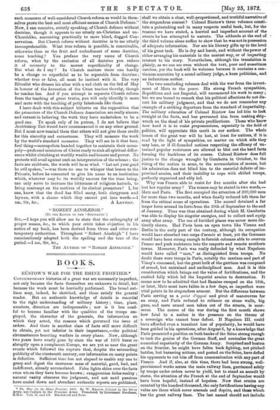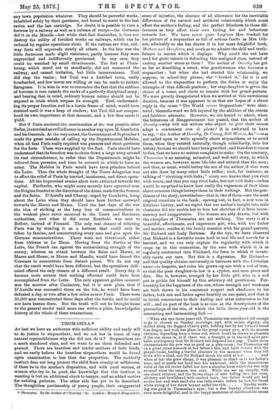BOOKS.
RUSTOW'S WAR FOR THE RLILVE FRONTIER.* CONTEMPORARY histories of a great war are necessarily imperfect, not only because the facts themselves are unknown in detail, but because the work mast be hurriedly performed. The broad out- lines may, indeed, be sketched, and these satisfy the general reader. But an authentic knowledge of details is essential to the right understanding of military history ; time, place, numbers, direction are indispensable ; nor is it less need- ful to become familiar with the qualities of the troops em- ployed, the character of the generals, the information on which they acted, the reasons which governed the issue of orders. And there is another class of facts still more difficult to obtain, yet not inferior in their importance,—the political circumstances besetting warfare in every phase. Now, although two years have nearly gone by since the war of 1870 burst so abruptly upon a complacent Europe, we are yet so near the great events which followed the rupture that, despite the astounding publicity of the nineteenth century, our information on many points is defective. Sufficient time has not elapsed to enable any one to grasp and digest the enormous mass of material, good, bad, and indifferent, already accumulated. False lights shine over the facts even where they have become known ; exaggeration hides reality ; natural vanity obscures the judgment, and not until passions have cooled down and abundant authentic reports are published, * The War for the Rhine Frontier, 1870. B1 W. Rtistow, Colonel in the Sw:ss Army, late Captain in the Prussian Army. Translated by Lieutenant Needham, M.A. Vols. IL and III. Blackwood and Sous. shall we obtain a clear, well-proportioned, and truthful narrative df the stupendous contest? Colonel Riistow's three volumes consti-
tute a painstaking and in many respects useful book, but, for the reasons we have stated, a harried and imperfect account of the events he has attempted to narrate. The addenda at the end of the third volume alone suffice to show that he was not in possession of adequate information. Nor are his literary gifts up to the level of his great task. He is dry and harsh, and without the power of either arranging his materials in the neatest way, or of imparting interest to his story. Nevertheless, although the translation is plainly, as we can see even without the text, poor and sometimes careless, yet the book will be welcome because it contains a con- tinuous narrative by a sound military judge, a keen politician, and an industrious author.
The two concluding volumes deal with the war from the invest- ment of Metz to the peace. His strong French sympathies, Republican and not Imperial, will recommend his work to many ; but we are bound to remark that his political affections do not dis- tort his military judgment, and that we do not remember any example of a striking departure from the standard of impartiality.. The military education of Colonel Riistow has led him to look straight at the facts, and has prevented him from making ship- wreck on the shoal of his private predilections. Those who know how hard it is to resist prepossessions, especially in the field of politics, will appreciate this merit in our author. The whole lesson of the great war will be lost, at least for nations, if it is read by the light of sympathies, no matter on which side they may lean, or if ill-founded notions respecting the efficacy of un- trained popular resistance are allowed to blot out the hard facts. forming the backbone of its course. Colonel Riistow does full justice to the change wrought by Gambetta in October, to the rising of the nation in arms, to the accumulation of means, but his admiration does not blind him to the essential defects of im- provised armies, and their inability to cope with skilled troops, perfectly organised and ably led.
Why was France able to resist for five months after she had lost her regular army? The reason may be stated in two words,— Metz and Paris. The first occupied the attention of 200,000 men for more than two months, and when finally reduced left them far from the critical scene of operations. The second detained a far larger force around its forts from the 20th of September to the end, of January. Time was thus obtained during which lii. Gambetta was able to display his singular energies, and to collect and equip' army after army. The use of fortified places was never more dis- tinctly shown. Had Paris been an open town like Vienna and Berlin in the early part of the century, although its occupation, would have absorbed two corps d'armee at least, yet the Germans. would have been strong enough to furnish columns able to overrun. France and push resistance into the seaports and remote southern, towns. Moreover, Paris was really defended by what Napoleon, would have called "men," as distinguished from troops. No. doubt there were troops in Paris, notably the marines and part of Vinoy's command, but the great bulk of the garrison was composed of armed, but untrained and undisciplined men. And it is this- consideration which brings out the value of fortifications, and the exalted folly which led the Imperial armies to destruction. It seems now to be admitted that had Bazaine escaped on the 16th„ or later, Metz must have fallen in a few days, so imperfect were vital points in its stupendous armour. But the difference between. Paris serving as a point d'appui and pivot of manceuvres for an army, and Paris reduced to reliance on stone walls, big guns, and mere armed men taken out of the streets, is enor- mous. The course of the war during the first month shows, how fatal to a nation is the presence on the throne of a sovereign who cannot bear defeat. If Napoleon III, could have afforded even a transient loss of popularity, he would have- been guided in his operations, after August 6, by a knowledge that. Paris presented a position on both banks of the Seine strong enough. to task the genius of the German Staff, and neutralise the great- numerical superiority of the German Army. Surprised and beaten- on the frontier, he might have fallen back fighting, not pitched battles, but harassing actions, and posted on the Seine, have defied his opponents to cut him off from communication with Rupert of France. And if, also, at this time, there had been strong, well- provisioned works across the main railway lines, garrisoned solely by troops under orders never to yield, but to stand an assault by storm, the situation of the French at the end of September would have been hopeful, instead of hopeless. Now that armies are- counted by the hundred thousand, the only fortifications having any value are those which cover arsenals and depots, and those which. bar the great railway lines. The last named should not include any town population whatever. They should be powerful works, inhabited solely by their garrisons, and bound to resist to the last ration and the last cartridge. No doubt it is possible to turn a fortress by a railway as well as a column of troops—the Germans did it on the Moselle—but while that fact diminishes, it does not destroy the utility of fortified works on railways, which can be reduced by regular operations alone. If the nations are wise, rail- way forts will supersede nearly all others. In the late war the little fortresses made slight resistance, partly because they were unprovided and indifferently garrisoned. In any case, they -could be watched by small detachments. The fort at Phals- bourg, which stood out so steadfastly, did not command the railway, and caused irritation, but little inconvenience. Tout -did stop the trains ; but Tout was a fortified town, easily bombarded, and few towns are willing or can be made to imitate Saragossa. It is wise in war to remember the fact that the sublime -of heroism is rare outside the ranks of a perfectly disciplined army ; and bearing that in mind, ordinary human nature should not be exposed to trials which surpass its strength. Toul, understand- ing its proper function and in a heroic frame of mind, would have resisted until it was a heap of cinders ; but Toul did not compre- hend its own importance at that moment, and a few fires made it yield.
But if Paris rendered the continuation of the war possible after Sedan, it exercised an evil in fluence in another way upon M. Gambetta and his Generals. At the very outset, the Government of September 4 -made the great mistake of calling up the Departmental Mobiles, when all that Paris really required was gunners and stout garrisons for the forts. These were supplied by the fleet. Paris should have understood that its function was to chain down a large army around its vast circumference, in order that the Departments might be relieved from pressure, and time be secured in which to form an army. The Mobiles in Paris would have been priceless behind the Loire. Then the whole thought of the Tours delegation was to effect the relief of Paris by hurried, incoherent, and direct opera- tions. All the improvised armies afoot were attracted towards the
Faidherbe, who might more securely have operated near the Belgian frontier in the direction of the Aisne, made for the Somme -and the Seine. D'Aurelle and Chanzy, urged by Gambetta, hung -about the Loire when they should have been further eastward towards the Marne and Meuse. Until the last days of the war the idea of striking at the long line of communications in the weakest place never occurred to the Tours and Bordeaux authorities, and when it did occur Bourbaki was sent to Belfort, instead of Frouard. The only real chance of relieving Paris was by treating it as a fortress that could only be taken by famine, and concentrating every man and gun upon the 'German communications. These were not threatened, either from Orleans or Le Mans. Moving from the Sarthe or the Loire, the French ran against the accumulating strength of the -enemy, whereas an attack between the Seine and Marne, or Marne and Meuse, or Meuse and Moselle, would have forced the Germans to concentrate from distant points. We do not say that the result would have been different, but the operations indi- -cated offered the only chance of a different result. Every day it became more certain that nothing effectual could have been accomplished from the Loire. The only apparent golden moment was the morrow after Coulmiers, but it is now plain that if D'Aurelle was successful there on the 9th, he would have been defeated a day or two after a few miles nearer Paris. There were -50,000 men concentrated three days after the battle, and be could not have beaten them. But the truth will not be brought home to the general reader until some one writes a plain, knowledgable history of the whole of these transactions.



































 Previous page
Previous page